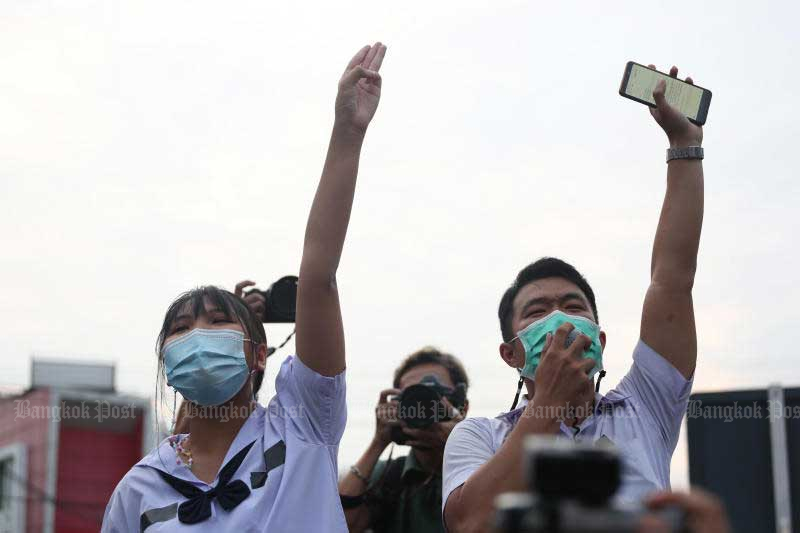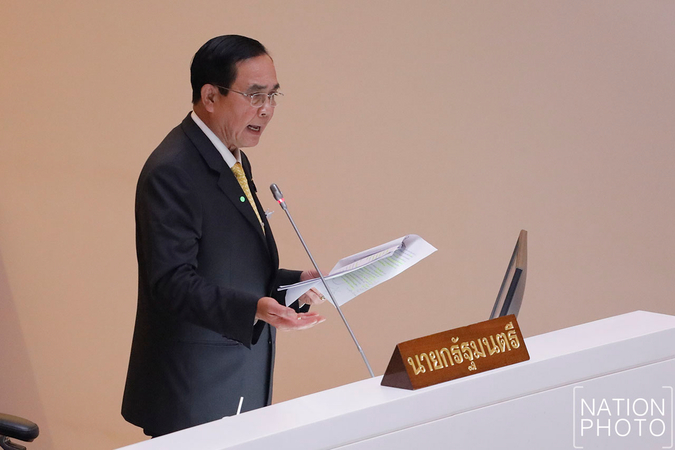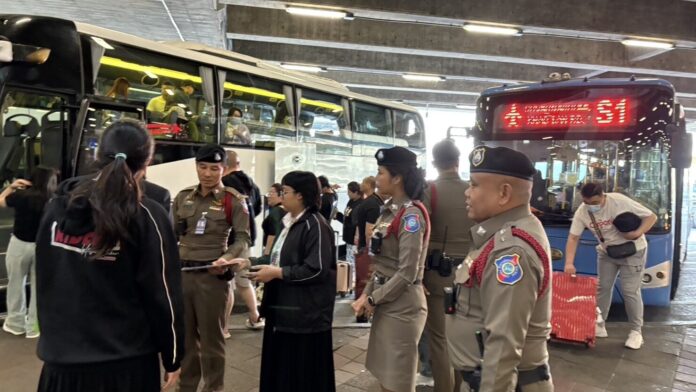 Young anti-government protesters at Kasetsart intersection throw up the three-finger salute on Monday. (Photo by Varuth Hirunyatheb)
Young anti-government protesters at Kasetsart intersection throw up the three-finger salute on Monday. (Photo by Varuth Hirunyatheb)
The government is struggling to deal with tech-savvy youth-led demonstrators who make the most use of information and communication technologies and social media platforms as a major tool in their anti-government campaign, academics and former protest leaders said.
They also raised concern about possible confrontations between anti-government protesters and pro-monarchy groups who are coming out to counter their demands for reform of the monarchy.
The demonstrations led by Khana Ratsadorn (People's Group) are unique and different from previous ones in that social media platforms have been used as a tool to mobilise protesters in a short time which can pile up pressure on the government, despite the fact there are no "visible" protest leaders controlling them.
This is because several co-leaders of the group were arrested and faced multiple charges, leaving the movement leaderless.
Protesters are pressing hard for their demands including a charter rewrite, monarchy reform and the resignation of Prime Minister Prayut Chan-o-cha.
Tensions have mounted as yellow-clad groups have appeared in Bangkok and several provinces to voice opposition to the call for monarchy reform, raising concerns about possible clashes.
Protesters inspired by online games
Mana Treelayapewat, deputy rector of the University of the Thai Chamber of Commerce, told the Bangkok Post that those who take part in the anti-government demonstrations are largely digital natives who have grown up in the digital age and have the ability to use information and communication technologies and have their own technical jargon and secret codes to communicate with each other.
It is similar to when young people take part in school sport day activities or when they attend concerts, Mr Mana said.
"When they gather for demonstrations or disperse, they can communicate with each other and vote via social media. It is a two-way communication, which appeals to this generation,'' he said.
He said any demonstration must always have leaders, though it depends on what form they take.
The demonstrations see many different co-leaders making a wide range of demands, compared to past demonstrations which were managed by a single group of protest leaders. When they were arrested by authorities, this spelled trouble for their movement, Mr Mana said.
However, the current anti-government movement is similar to online games because when a group of protest leaders were arrested, another group emerged to carry on and they are linked by using social media, Mr Mana said.
''Their war rooms are unconventional. It is similar to playing online games. There are many war rooms both online and offline,'' he said.
Boonyou Khorpornprasert, a lecturer in communication arts at Krirk University's faculty of liberal arts, said he did not believe that the demonstrations are leaderless, saying those who are perceived to be protest leaders may appear on the stage to work the crowds, though actual leaders pull strings behind the scenes.
Some protest leaders may mingle secretly with other rank-and-file protesters and manage the crowds with technologies rather than showing themselves as in past protests, Mr Boonyou said.
"The government may be underestimating the protesters and use conventional methods to deal with them,'' Mr Boonyou said.
"But technologies are changing so fast that the government cannot catch up. Though the government has technological resources at its disposal, its personnel may not be as good as the new generation, not to mention bureaucratic red tape that hinders action."
Asawin Nedpogaeo, a lecturer in communication and innovation at the National Institute of Development Administration (Nida), said this new generation spends life with the internet so much so they are skilful at communication on online platforms.
Many protesters are young students who have a similar mindset, making it easier for them to relate to each other with the help of social networks, he said.
PM resignation a solution
Jatuporn Prompan, chairman of the red-shirt United Front for Democracy against Dictatorship, said demonstrators have learnt to adapt their game plan by using social media as a tool and stay one step ahead of the government.
Despite having better resources at its disposal, the government's information operations are less efficient than those of the demonstrators, Mr Jatuporn said, adding the government can no longer afford to use conventional methods to deal with them.
He said the government made the first wrong move by declaring a state of emergency to tackle anti-government protests in Bangkok which only fuelled resistance among protesters, even though the state of emergency was lifted on Thursday to ease tensions.
Mr Jatuporn suggested one solution is to push through a charter rewrite when parliament opens for a special session to discuss the matter tomorrow and Tuesday.
But the best way around the problem is for Gen Prayut to resign, Mr Jatuporn said, adding that six years in power should be enough for Gen Prayut.
Now is the time for the prime minister to call it quits so he can step down and exit gracefully, Mr Jatuporn said.
Protesters suffer if rallies drag on
Suriyasai Katasila, dean at Rangsit University's College of Social Innovation, and a former coordinator of the yellow-shirt People's Alliance for Democracy, described the youth-led protests as "new normal political science" with the use of digital technology to make their political statements and push for their demands.
This has both advantages and disadvantages, he said.
The advantage is that if the technology is used constructively, this will become a potent force in creating direct democracy. On the contrary, unconstructive use of it could also become a double-edged sword and lead to unrest, Mr Suriyasai said.
As for the protesters, they can use the technology well enough to create headaches for the government during the early stages of their rallies, forcing the government to adjust its stance against them, Mr Suriyasai said.
However, protesters may also face other opponent groups which also use digital platforms to counter them as both sides will launch information operations against each other, and it is hard to distinguish between true and false information.
Mr Suriyasai said a weakness in these digital platforms is that they become a weapon rather than serving as a forum for discussion.
Commenting on the tactic of "flash mobs" with demonstrators dividing up into small groups and moving around over wide areas of the capital, Mr Suriyasai said this will not be workable in the long term.
This flash-mob style rally sees protesters come together for a brief period, then disperse quickly, prompting demonstrators to wonder when they will achieve victory, Mr Suriyasai said.
As the protests drag on with no victory in sight, protesters, most of whom are young students, will become bored as they feel they are "having no fun".
As a result, pressure will shift back onto the protesters instead, Mr Suriyasai said, adding that conflict may also arise among protesters as their patience is wearing thin as the conflict drags on.
Without leaders taking charge, the protests will also run the risk of getting out of hand as people could lose their cool, he said.
He suggested that protesters present clear demands to the government and find representatives to sit down for talks with the govenrment. Conflicts can be resolved through dialogue, he said.
Mr Suriyasai said he believed the government is engaging in a test of patience against the demonstrators.
Whichever side that maintains their composure will win, but those who lose their calm and resort to violence will lose, Mr Suriyasai said, adding that this is an approach being used by the government to deal with the demonstrators. The question is who will succeed.
However, it is unlikely that another coup will take place as those in power have learnt lessons from the past, he said.

















